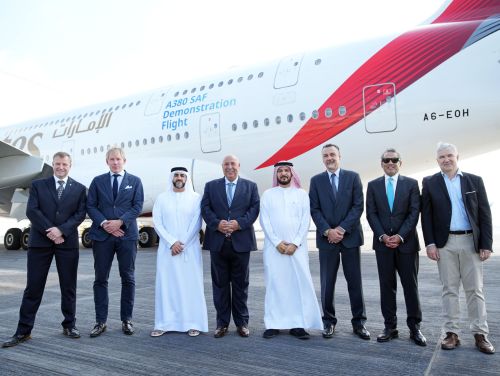Emirates has become the world’s first airline to operate an A380 demonstration flight using 100% Sustainable Aviation Fuel (SAF)
Today’s flight, commanded by Captain Khalid Binsultan and Captain Philippe Lombet, took off from Dubai International Airport (DXB) with one of four engines powered on 100% SAF, helping demonstrate its potential as a drop-in replacement that matches jet fuel’s technical and chemical requirements, while being a more sustainable alternative.
SAF is currently capped at a 50% blend limit in engines for commercial flights.
Dedicated collaborators from Airbus, Engine Alliance, Pratt & Whitney, Neste, Virent and ENOC have been working on the testing, technical assessments and data analysis for the flight.
The 100% drop-in SAF used on today’s flight includes renewable aromatics and closely mimics the characteristics of conventional jet fuel. This is the first time that drop-in SAF has been used on an A380 aircraft, with the expectation of full compatibility across the aircraft’s existing systems. The flight carried four tonnes of SAF.
The 100% SAF was used in one Engine Alliance GP7200 engine, while conventional jet fuel was used in the other three engines. The PW980 auxiliary power unit (APU) from Pratt & Whitney Canada also ran on 100% SAF.
Last week, robust engine testing for one A380 Engine Alliance GP7200 engine using 100% SAF was carried out, with the objective of validating the engine’s capability to run on the specially blended 100% drop-in SAF without affecting its performance or requiring any modifications. Ground engine testing took place at the state-of-the-art Emirates Engineering Centre in Dubai.
Adel Al Redha, COO, Emirates Airline said, "The growing global demand for lower-emission jet fuel alternatives is there, and the work of producers and suppliers to commercialise SAF and make it available will be critical in the coming years to help Emirates and the wider industry advance our path to lower carbon emissions."

Julie Kitcher, Airbus’s executive vice president for communications and corporate affairs said, "These [SAF] fuels are the most effective way to address CO2 emissions in the aviation industry today and that they are supported increasingly by the world's leading airlines. SAF is vital to meeting the sector's target of net-zero emissions in 2050, but needs the backing of the whole industry. At Airbus, we are working to make all our aircraft 100% SAF-capable by 2030. We're also working with partners to grow the global SAF market in the coming years."
Earlier this year, Emirates successfully completed the first 100% SAF-powered demonstration flight in the region on a GE90-powered Boeing 777-300ER.
Last month, the first Emirates flights operating with SAF provided by Shell Aviation took off from Dubai International Airport (DXB). Shell supplied 315,000 gallons of blended SAF for use at the airline’s hub in Dubai.
The airline recently expanded its partnership with Neste for the supply of over 3 million gallons of blended SAF in 2024 and 2025 for flights departing from Amsterdam Schiphol and Singapore Changi airports.






